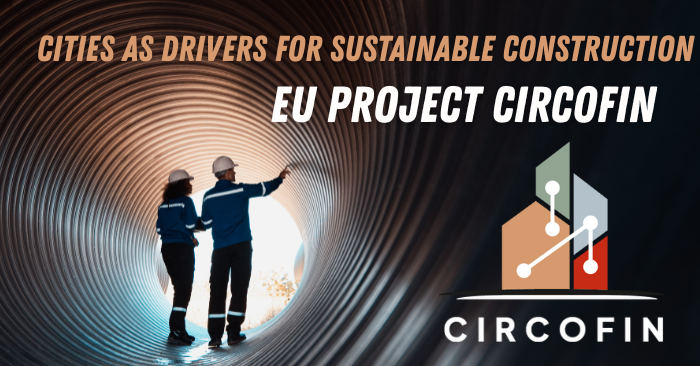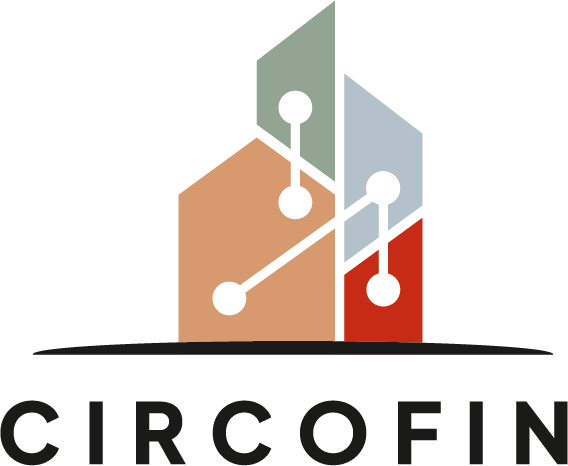
CirCoFin

EU project CirCoFin: Cities as a driving force for sustainable construction
The construction sector is currently anything but sustainable. It accounts for 50 per cent of all raw materials extracted worldwide and 30 per cent of all fresh water consumed, while producing over 30 per cent of waste and between 40 and 70 per cent of energy-related CO2 emissions. The problem is huge - but so is the potential for solutions. According to the Circularity Gap Report, the construction industry has the greatest potential for circularity in the world.
With strong circular strategies, 9.5 billion tonnes of construction and demolition waste could be reused globally, which is more than four times the amount of solid waste generated by households worldwide. This circular approach could also reduce the CO2 emissions from the production of building materials by 38 per cent by 2050.
Circular strategies for sustainable construction in cities
In Europe, 75 per cent of the population lives in cities and urban areas. They therefore account for a large proportion of total resource consumption and associated emissions. Cities are therefore the key lever through which new circular economy strategies can achieve maximum impact.
This is precisely where the EU's Circular Construction Finance (CirCoFin) project comes in. It aims to turn cities into active shapers of sustainable construction by mobilising private investors, innovative business models, smart financing strategies and new requirements for building regulations and public tenders.
The lever: Circular Construction Hubs (CCH)
‘Circular Construction Hubs’ (CCHs) are a key to this. They link demolition and new construction by collecting, cataloguing and reselling used components. This saves raw materials, reduces waste and lowers emissions.
Ideally, they include a physical material bank (PMB) and a digital marketplace (DM). CCHs are central access points, often operated by private actors, that provide essential services ranging from storage and logistics, preparation of materials for reuse, scanning and cataloguing of the existing building stock, to expertise in the recycling of secondary materials and components.
However, the widespread use of this concept has been hampered by legal barriers, a lack of market size and entrenched construction practices.
Favourable conditions for change
The opportunity for change is here: rising raw material prices, higher landfill costs, new ESG criteria1 and increasing regulation are making sustainable construction more economically attractive.
As the use of CCHs becomes the norm in the future, it will influence the choice of materials and components in the design phase and encourage disassembly and reuse. Over time, new buildings will contain more and more elements that can be disassembled, making them easier to dismantle. The quality of materials and components should be maintained to make reuse easier and more likely.
1 ESG criteria stand for Environmental, Social and Governance. They are standards for assessing the sustainability and ethical responsibility of companies and investments.
Four model projects pave the way to more sustainability in the construction industry
CirCoFin is launching four pilot projects in Munich, Copenhagen, Lisbon and Scotland. Each is designed to show how circular economy works in the construction sector. These includes feasibility studies, business plans and innovative financing instruments. At the same time, a transferable methodology for CCHs will be developed that can be applied in other cities in the future.
The idea is to create flagship projects to convince investors, developers and authorities across Europe. The construction sector needs to change from being a resource guzzler to a recycling pioneer – and CirCoFin wants to lead the way.

Contact

Marc Jehle
City of Munich
Department for Environmental and Climate Protection
E-mail: circofin@no-spam-pleasemuenchen.de
Contact at BayFOR

M. A. Marcus Süß
Team Coordinator Project management
Project Manager EU project CirCoFin
Phone: +49 911 50715-940
Email: suess@no-spam-pleasebayfor.org

M. Sc. Sebastian Botzler
Scientific Officer
Environment, Energy & Bioeconomy
Phone: +49 89 9901888-123
Email: botzler@no-spam-pleasebayfor.org




